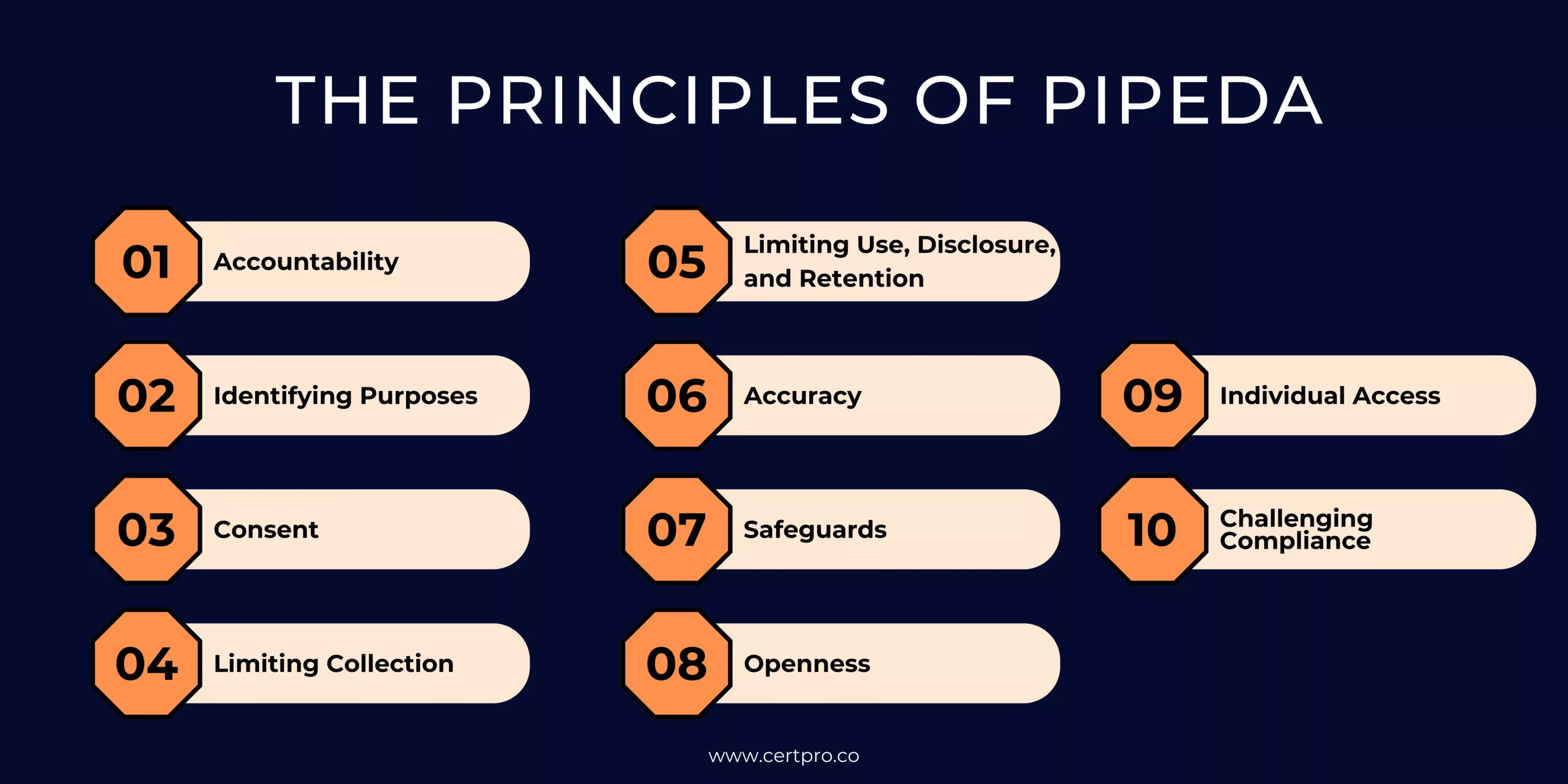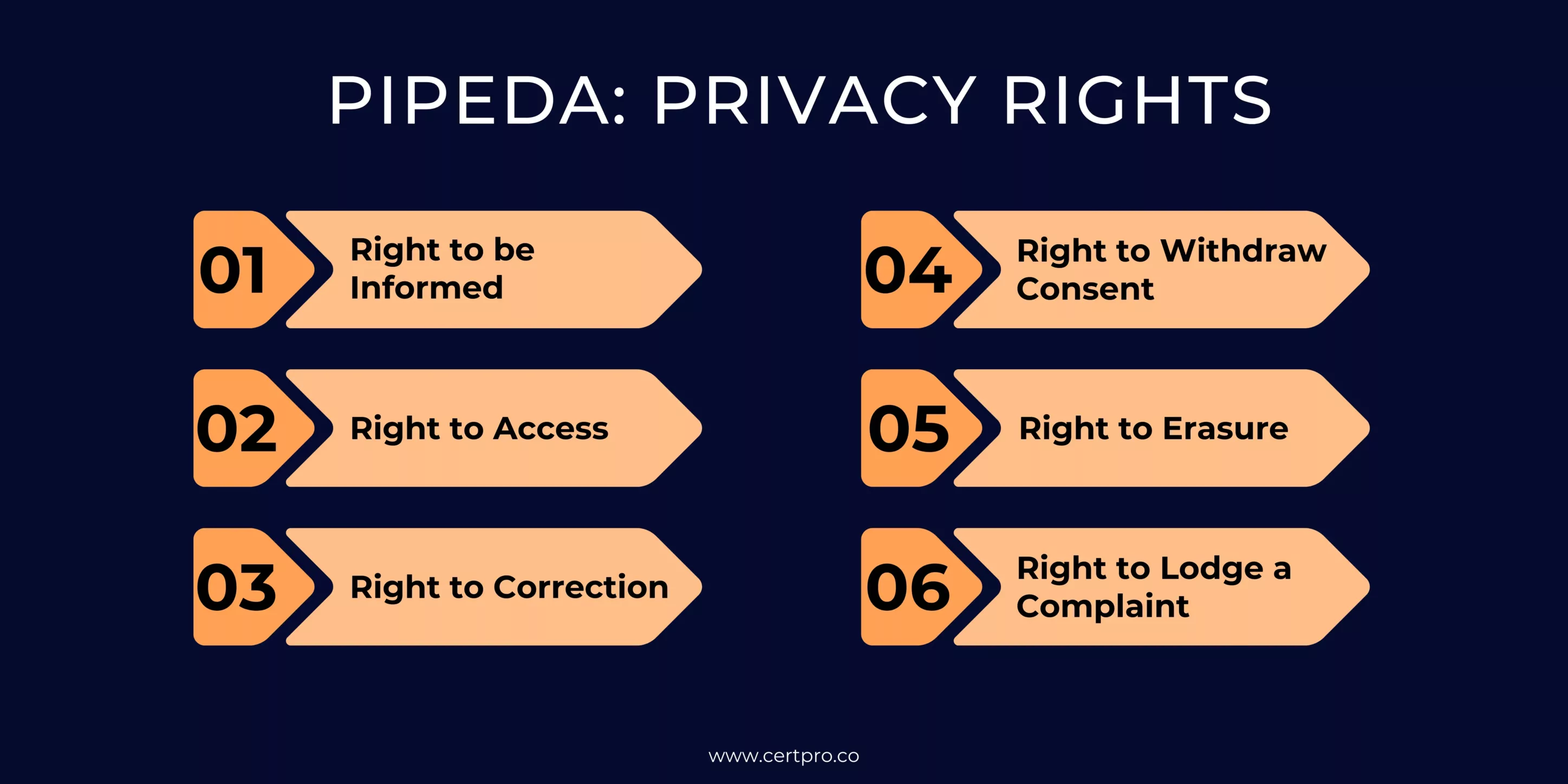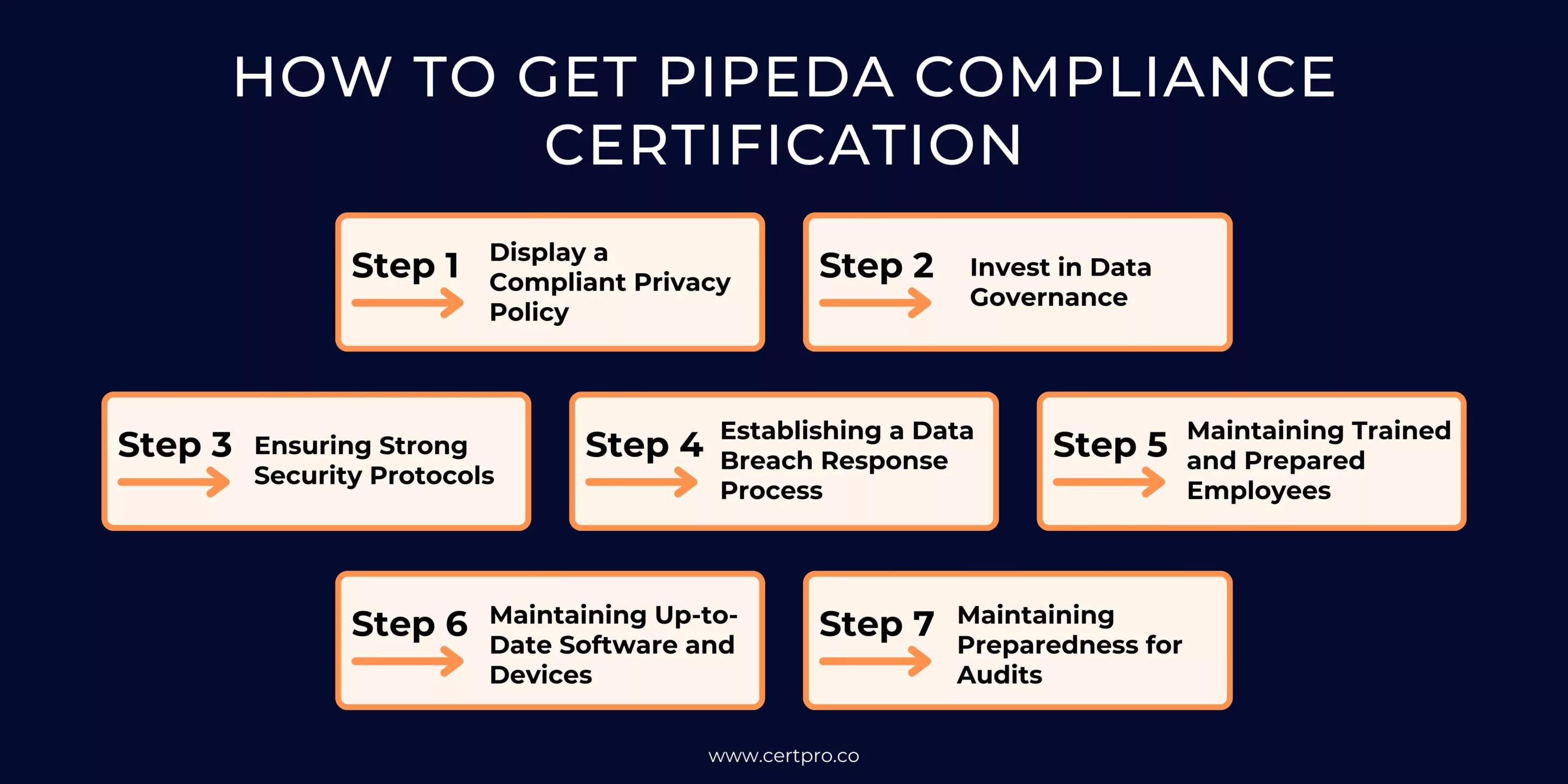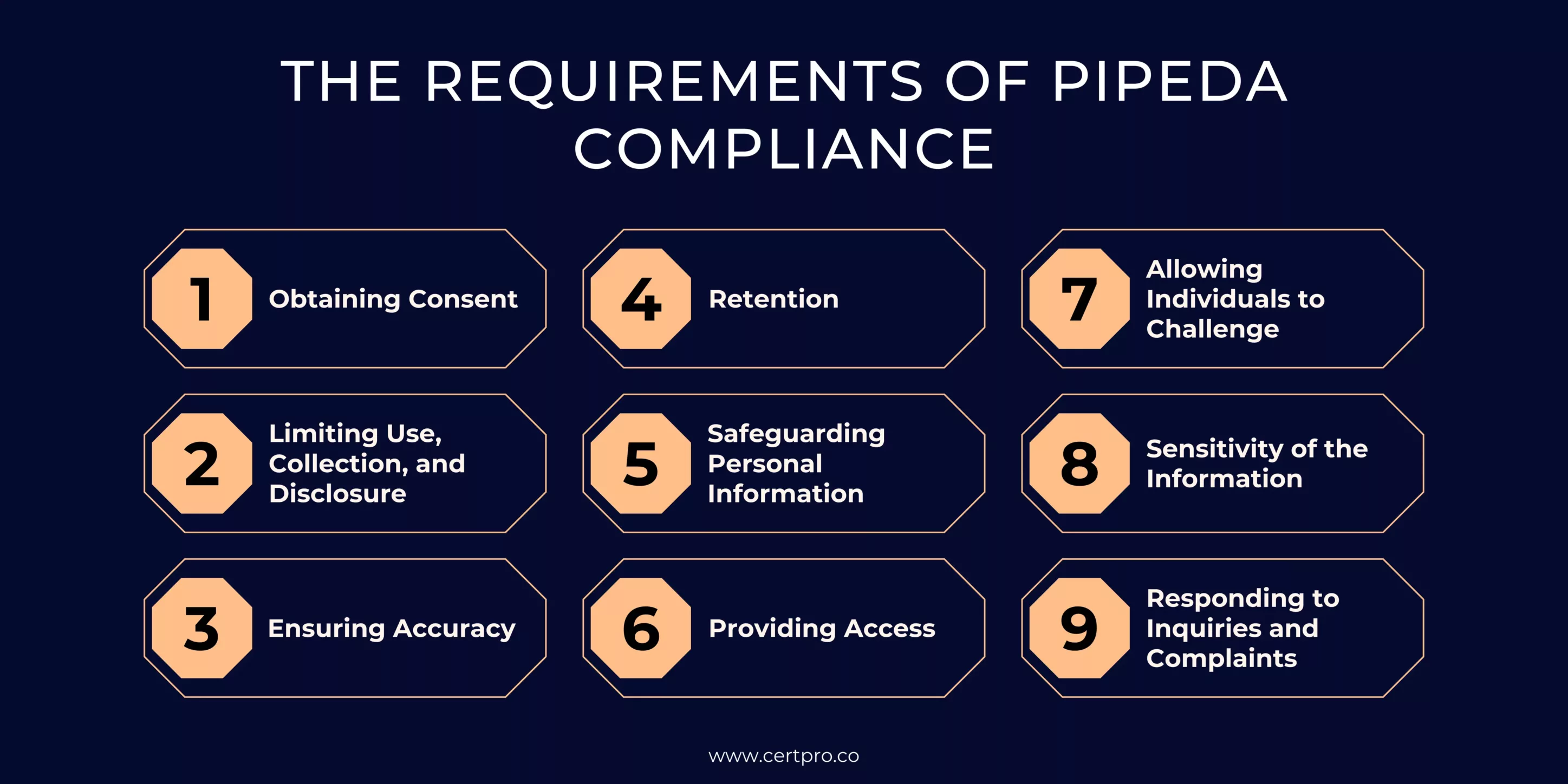PIPEDA
Personal Information Protection and Electronic Documents Act
The Personal Information Protection and Electronic Documents Act (PIPEDA) is a federal law in Canada that regulates the collection, use, and disclosure of personal information by organizations engaged in commercial activities. It applies to various sectors, including private sector organizations, non-profit organizations, and federal government organizations involved in commercial activities.
Compliance with PIPEDA holds immense importance for organizations, as it safeguards the privacy rights of individuals and fosters trust between individuals and the organizations that collect and utilize their personal information. Failure to comply with PIPEDA can result in penalties and significant damage to an organization’s reputation. Obtaining a PIPEDA compliance certificate signals to clients that a business is committed to safeguarding their personal information, thereby establishing a sense of security.

CERTIFICATION AND AUDITING SERVICES BY CERTPRO FOR PIPEDA
WHY CHOOSE CERTPRO FOR PIPEDA CERTIFICATION AND AUDITING?
| Factors | CertPro Advantage |
|---|---|
| Time to Certification | 4x faster than traditional approaches |
| Price | Competitive rates with flexible options |
| Process | Streamlined and efficient methodology |
| Expertise | 10+ years of industry experience |
CERTPRO’S COST-EFFECTIVE APPROACH TO PIPEDA CERTIFICATION
| No. of employees | Timeline | Cost (approx.) |
| 1 – 25 | 4 weeks | 2500 USD |
| 25-100 | 6 weeks | 3500 USD |
| 100-250 | 6-8 weeks | 5000 USD |
| 250 plus | 8 weeks | Custom plans |
UNDERSTANDING THE PERSONAL INFORMATION PROTECTION AND ELECTRONIC DOCUMENTS ACT (PIPEDA)
PIPEDA pertains to personal information, broadly defined as any information related to an identifiable individual. It includes details like name, address, email, phone number, date of birth, social insurance number, financial data, and medical information.
However, PIPEDA does have exemptions. For instance, it may not apply to organizations operating solely within a province or territory with privacy legislation that closely aligns with PIPEDA. It also exempts personal information collected for journalistic, artistic, or literary purposes and employee information used solely for employment-related matters. Organizations must determine whether PIPEDA applies to them and, if so, ensure compliance with its requirements.
THE PRINCIPLES OF PIPEDA
1. Accountability: Organizations are accountable for the personal information they control, and they shall designate one or more individuals who are responsible for ensuring PIPEDA compliance. This accountability also extends to any personal data transferred to third-party vendors for processing.
2. Identifying Purposes: Your organization should identify the reason for collecting personal information before or at the time of collection.
3. Consent: The collection, use, or disclosure of personal information requires knowledge and individual consent, unless this is deemed inappropriate.
4. Limiting Collection: The organization shall collect only necessary personal information for identification purposes. They collect information through fair and lawful means.
5. Limiting Use, Disclosure, and Retention: Personal information shall not be used or disclosed for any purpose other than the original collection, except with the consent of the individual or as required by law. The organization may retain personal data only for as long as necessary to fulfill the stated purposes.
6. Accuracy: Personal information shall be maintained in an accurate, complete, and up-to-date manner as required for its intended use.
7. Safeguards: Protecting personal information with security measures appropriate to the sensitivity of the data
8. Openness: An organization shall provide individuals with readily available, specific information regarding its policies and practices concerning personal information management.
9. Individual Access: Upon request, the organization shall provide an individual with information regarding the existence, use, and disclosure of their personal information and grant them access to such information. Individuals shall have the right to challenge the accuracy and completeness of the information and request its amendment as necessary.
10. Challenging Compliance: An individual has the right to raise concerns or challenges regarding compliance with the above principles. They can address these concerns to the designated one or more individuals responsible for ensuring the organization’s compliance.

PIPEDA: PRIVACY RIGHTS
- Right to be Informed: Organizations must inform individuals of the identified purposes for processing their personal information, whether orally or in writing, while PIPEDA does not explicitly label it as the right to be informed.
- Right to Access: Individuals have the right to access information regarding the existence, use, and disclosure of personal information. Organizations must respond to access requests within a reasonable timeframe, typically no later than 30 days from receipt, and provide the response at minimal or no cost.
- Right to Correction: Individuals have the right to request organizations rectify any inaccurate records of their personal information. It is also essential for these corrections to be conveyed to relevant third parties downstream.
- Right to Withdraw Consent: Individuals have the right to withdraw their consent at any time. Nevertheless, organizations may retain personal information for as long as it is necessary to fulfill the purpose of collecting it.
- Right to Erasure: The Office of the Privacy Commissioner (OPC) maintains that individuals can delete their posted information online. Some suggest that PIPEDA currently encompasses this right within the context of the right to withdraw consent.
- Right to Lodge a Complaint: If individuals believe that an organization has violated PIPEDA, they have the right to complain to the OPC.
Organizations subject to PIPEDA must incorporate information about these privacy rights in their privacy notices. It should include guidance on how individuals can exercise these rights and provide instructions on verifying their identity when submitting requests.

HOW TO GET PIPEDA CERTIFICATION
To achieve PIPEDA compliance, here are a few recommended steps:
1. Display a Compliant Privacy Policy
Displaying a compliant privacy policy is a Key step for PIPEDA compliance. It ensures transparency by clearly outlining how user information is collected, used, and disclosed. The policy should be understood, accessible, and regularly updated to align with privacy regulations and user expectations.
2. Invest in Data Governance
Investing in data governance is essential for PIPEDA compliance. It involves implementing practices and technologies to ensure data privacy, accuracy, security, availability, and usability. Strong data governance measures protect personal information, prevent breaches, and facilitate consumer access to necessary data.
3. Ensuring Strong Security Protocols:
Implementing robust security protocols is essential for PIPEDA compliance. It involves evaluating and optimizing security measures to protect against data breaches and malicious actors. Reliable security applications, services, and support act as the first line of defense for protecting personal information.
4. Establishing a Data Breach Response Process:
It is vital to develop a well-defined plan to respond to data breaches. By having a prepared management plan, organizations can effectively mitigate the negative consequences associated with such incidents and ensure prompt and appropriate actions when needed.
5. Maintaining Trained and Prepared Employees:
Since organizations subject to PIPEDA often deal with sensitive personal information, it is essential to ensure that employees receive proper training. This training should focus on recognizing and mitigating common data breach risks, including phishing tactics. Additionally, employees should be equipped with knowledge of how to handle personal information securely during commercial transactions, minimizing the potential for data breaches.
6. Maintaining Up-to-Date Software and Devices:
Outdated technology can increase the risk of data privacy issues by providing easier access for malicious actors. It is crucial to regularly download updates, upgrade software, and optimize data collection methods as necessary to mitigate vulnerabilities and enhance data protection measures.
7. Maintaining Preparedness for Audits:
Organizations must organize and make relevant information available for audits to ensure ongoing compliance. Data discovery platforms are essential in identifying, classifying, and monitoring sensitive data, facilitating adherence to regulations like PIPEDA. With visibility into data types and locations, organizations can implement security measures to prevent unauthorized access or misuse, improving compliance processes.

THE REQUIREMENTS OF PIPEDA COMPLIANCE
- Obtaining Consent: Before collecting, using, or disclosing an individual’s personal information, organizations must acquire explicit and informed consent from the individual. It is essential to inform the individual about the specific purpose for which their personal information is being collected, used, or disclosed.
- Limiting Use, Collection, and Disclosure: Organizations must restrict the collection, use, and disclosure of personal information to what is strictly necessary for the identified purposes. If there is a need to use the information for new purposes, obtaining consent from the individual is essential before proceeding with such use.
- Ensuring Accuracy: Organizations are responsible for taking reasonable measures to ensure the accuracy, completeness, and updates of personal information in their possession.
- Retention: Organizations must maintain personal information only for the duration necessary to fulfill the purposes of collecting it.
- Safeguarding Personal Information: Organizations must establish and maintain suitable security safeguards, encompassing physical, organizational, and technological measures, to protect personal information from unauthorized access or disclosure.
- Providing Access: Organizations are obligated to, upon request, inform individuals about the existence, usage, and disclosure of their personal information and grant them access to that information.
- Allowing Individuals to Challenge: Individuals have the right to contest the accuracy and completeness of the personal information that organizations hold about them. They can request necessary amendments to ensure the data is accurate and complete.
- Sensitivity of the Information: Organizations must acknowledge the sensitivity of particular types of information, such as personal health information, and provide the additional protection necessary in accordance with applicable regulations.
- Responding to Inquiries and Complaints: Organizations should address inquiries and complaints regarding their privacy practices promptly and appropriately, ensuring timely and satisfactory resolutions.
Non-compliance with these requirements may lead to penalties, reputational damage, and a loss of consumer trust. In severe cases, individuals take legal action against organizations, and federal courts can enforce remedies for substantial harm resulting from unauthorized access to personal information.

BENEFITS OF PIPEDA COMPLIANCE
Legal Compliance: Adhering to PIPEDA ensures that organizations comply with the legal obligations established by the Canadian government. By being PIPEDA-compliant, organizations can mitigate the risk of penalties, fines, and legal repercussions that may arise due to non-compliance.
Customer Trust and Confidence: PIPEDA compliance showcases an organization’s dedication to safeguarding individuals’ personal information and upholding privacy rights. It fosters trust and confidence among customers, as they feel assured that the organization handles their personal information responsibly and securely.
Enhanced Reputation: PIPEDA compliance has the potential to bolster an organization’s reputation. It highlights the organization’s commitment to prioritizing privacy and safeguarding customer data. It can lead to positive word-of-mouth recommendations, an improved brand image, and the attraction of new customers and business opportunities.
Competitive Advantage: Prioritizing PIPEDA compliance can give organizations a competitive edge in a world that values privacy. By emphasizing privacy and implementing robust data protection measures, organizations are more likely to attract privacy-conscious customers. Additionally, business partnerships may require compliance, as organizations prefer to team with PIPEDA-compliant entities to mitigate privacy risks.
Risk Mitigation: PIPEDA compliance aids in mitigating risks related to data breaches and unauthorized access to personal information. By implementing appropriate security measures and privacy practices, organizations can reduce the likelihood of data breaches, which lead to financial losses, reputational damage, and legal penalties.
Increased Data Accuracy: PIPEDA compliance mandates organizations to maintain the accuracy and completeness of personal information. Organizations can enhance the overall quality of their information by implementing processes and controls to verify and update customer data. Accurate data empowers organizations to make well-informed decisions and deliver superior customer service.
Transparent Data Practices: PIPEDA highlights the importance of transparency in organizations’ collection, use, and disclosure of personal information. Compliance involves clear privacy policies, obtaining consent, and facilitating access to personal data. Transparent practices foster customer trust and empower individuals to make informed decisions about data sharing.
International Data Transfers: PIPEDA compliance enables smoother cross-border data flows. Adhering to PIPEDA’s privacy principles demonstrates meeting data protection requirements and facilitating collaborations and data transfers with international partners and countries that mandate specific privacy safeguards.
Employee Privacy: PIPEDA compliance encompasses employee personal information, showcasing organizations’ dedication to safeguarding employee privacy, promoting a positive work environment, and fulfilling legal obligations concerning employee data, ensuring compliance.
ELIGIBILITY FOR PIPEDA COMPLIANCE
THE COST OF PIPEDA COMPLIANCE
CERTPRO’S SUPPORT IN ACHIEVING PIPEDA COMPLIANCE FOR YOUR BUSINESS
FAQ’s
WHAT IS THE ROLE OF CONSENT UNDER PIPEDA?
HOW DOES PIPEDA DEFINE PERSONAL INFORMATION?
WHAT ARE THE CONSEQUENCES OF NON-COMPLIANCE WITH PIPEDA?
ARE THERE ANY EXEMPTIONS OR EXCEPTIONS UNDER PIPEDA?
DOES PIPEDA HAVE AN EXPIRATION DATE?
HOW DOES THE NIST CYBERSECURITY FRAMEWORK FUNCTION, AND WHY IS IT IMPORTANT?
Emerging cyber threats make cybersecurity an essential consideration for organizations handling and managing data. In this regard, the NIST cybersecurity framework applies to improving your cybersecurity program. It is a set of guidelines that helps improve your...
UNDERSTANDING ISO 42001: A GUIDE FOR RESPONSIBLE AI MANAGEMENT SYSTEMS
The invention of artificial intelligence (AI) has changed the operational processes of many industries. However, the rapid growth of technology increases ethical, security, and privacy-related concerns. Therefore, the International Organization for Standardization...
EUROPEAN UNION’S ARTIFICIAL INTELLIGENCE ACT: HOW THIS GROUNDBREAKING LAW AFFECTS YOUR BUSINESS
Nowadays, Artificial Intelligence (AI) is transforming our lives exceptionally well. AI is now streamlining healthcare services, providing virtual assistance, and fulfilling queries. Technologies have boons and curses. Similarly, AI creates many concerns about...



